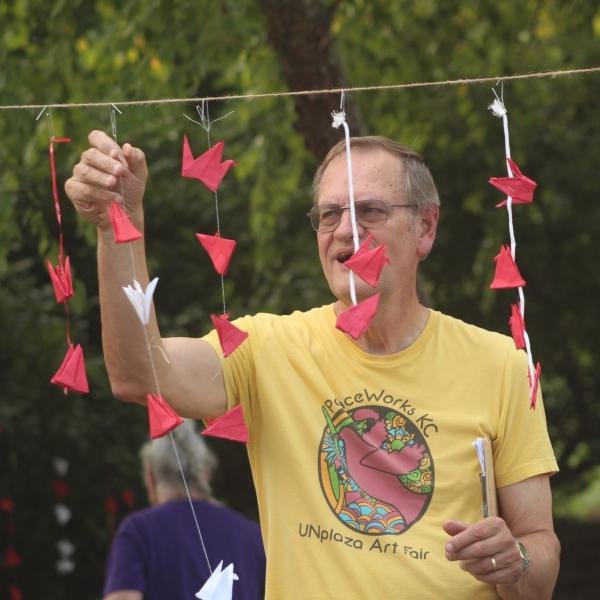By Joseph Wun
On Saturday, Jan. 21, 2017, I was standing near the back of the crowd at the Washington Square Park Women’s Rally in KCMO. Two uniformed police officers asked if I could speak with them for a moment, and I consented to go with them. When I asked why, they explained they were responding to a tip, a call, about a “suspicious, Middle-Eastern-looking male reaching into a backpack.” I was wearing a keffiyeh and a backpack.
 It was a stop-and- search for fitting a description—for fitting, perhaps, the description for what was justified since there was “the potential to hurt people.” The evidence was a picture, but one I never saw, nor, at the moment, had the presence of mind to demand. I responded in the manner I judged to be right, given my level of practice and my ongoing struggle to be free of the conditioning that guided me in this instance: how do I survive this encounter?
It was a stop-and- search for fitting a description—for fitting, perhaps, the description for what was justified since there was “the potential to hurt people.” The evidence was a picture, but one I never saw, nor, at the moment, had the presence of mind to demand. I responded in the manner I judged to be right, given my level of practice and my ongoing struggle to be free of the conditioning that guided me in this instance: how do I survive this encounter?
This is the indignity of the sort that is an everyday reality for those who are stopped and questioned by the police; it is the everyday reality for those who live under occupation, from the city neighborhoods of this country to Palestine. It was the sort of indignity to which I was treated, which I accepted out of fear, that I was given for standing outside, on a Saturday afternoon in the park, at a rally. A rally, a festival of speakers.
The police asked for my ID; I gave it to them. At once, I knew what they were doing, and hated them for it. I also felt paralyzed. Yet a strange confusion welled, one of sorrow, one that felt sore that they were pressed to perform in this way, and that they believed they had to execute this performance. That it must hurt them, too. I was acquiescing, hoping, foolishly, that they would also recognize the absurdity of their actions.
After waiting for my ID to run, which required a long-distance search to California, I realized I had not prepared myself for this stop and encounter—I was not expecting to be, potentially, detained. The crowd, the blessed, attentive crowd, that formed around me, that filmed and bore witness to the indignity of discriminatory policing in the name of security—I don’t know if they were prepared, either. We were, after all, at a rally. Now I know the National Lawyer’s Guild had positioned observers throughout the crowd.
I forgot. In the moment, I was thinking as I felt, as I have always felt when stopped by the police: that I was being held up—that they were going to take something from me, hurt me, if I did not navigate with razor-sharp precision. My rage settled into a searing, white-hot, quiet response.
They asked for my social security number, which I refused to give. I then, with this feeling of being held-up paramount, offered to open my backpack and disprove their claim. This option, after about 15 minutes of hold-up, came to pass. The officers found my almonds and papers to be “nothing, no weapons that could hurt
anybody.” They left.
This remembrance, which I share with you, is a confession: I know that I was in public and caught unpracticed. It was a moment of profound dissonance; I feel profoundly embarrassed. I confess my hope that those who bore witness to the encounter now know, now have glimpsed, the everyday indignity that people who express a particular phenotype, or wear a certain dress upon her head, his head, their bodies, endure.
I am telling you because I want you know, and that I am not okay, and that I am infuriated. I am telling you because I am not special in having this happen; I do not, however, believe it is normal. I am telling you because I hope your resolve to not accommodate injustice remains bold; I am telling you because I want you to keep me
accountable.
I am telling you because I want you to know the rights that I abrogated, and the manner in which these police were uninterested in those rights. This is fundamental, of course, but, as my example proves, worth review always.
The first question that you should ask, if and when you are in a situation similar:
Am I under arrest?
If the answer is no, then you are free to go.
If yes, then remain silent.
If, like me, you forgot this question, but recover yourself in the middle of the way through, stop consenting then and there, and be silent.
We who believe in freedom will not rest until it comes.
Hopeful, semi-related post-script: A woman came up to me as I sat on the ground, feeling dirty. She knelt. “Are you okay?” I could have cried at her kindness.
Though she was in plainclothes, she revealed a badge—a law enforcement officer of some kind—and told me that when she, showing her badge, asked the two men who questioned me what happened, they dismissed her entirely. “Not all of us are assholes.” “I know.” I believe, at least, in her. As one of the candid and elegant signs read: “The future is female.” Thanks be.
—Joseph Wun, a PeaceWorks Board member, lives in KCMO at Jerusalem Farm, which takes as its four pillars prayer, community, service, and simplicity.

